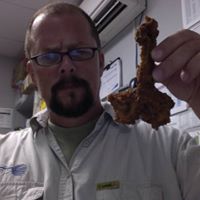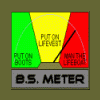Leaderboard
Popular Content
Showing content with the highest reputation on 04/11/2010 in all areas
-
I take no credit for writing this. I found it at: www.medicmadness.com If Chuck Norris was a Paramedic March 20, 2010 Posted by Sean If you have never heard of Chuck Norris, then you have been living under a rock with no daytime cable. From the “Delta Force” to “Walker Texas Ranger”, he has shown the world that he is one certified badass. Now today we are going to talk about what happens when you take Chuck Norris from the role of kicking ass to saving lives. So now the big question…… What kind of Paramedic would Chuck Norris be? Shifts Chuck Norris doesn’t work shifts. He tells people when they are allowed to have emergencies. This is done around his busy schedule. At no time will he be tied down to scheduled hours. Scene Safety We all know the “Texas Ranger” doesn’t need to cleared to a scene. As a matter of fact, he prefers to live life on the edge. The more dangerous the scene, the better. My guess is law enforcement wouldn’t be dispatched to any of his calls. Response Chuck Norris doesn’t respond to calls. The calls respond to him. When he gives the OK to have an emergency, patients will make their way to his location. He can’t be bothered with driving and trying to find peoples homes. Vehicle Chuck Norris doesn’t need a vehicle to respond in, as he doesn’t respond. Patient’s seeking his services must provide their own form of transportation. Partner Come on now…..we all know Chuck Norris works alone! Equipment Chuck Norris doesn’t need medical gear, tools or medications. Disease processes quiver at the very sight of Chuck Norris and have no choice but to immediately comply to his demands. Patients suffering from trauma usually got their injuries as a result of a Chuck Norris beating. There isn’t much treatment that can be done to improve their condition anyway. You can’t end a post about Chuck Norris without including some old Chuck Norris facts….. Here are some health/medical related Chuck Norris facts that I found for your reading pleasure! The leading causes of death in the United States are 1. Heart disease 2. Chuck Norris 3. Cancer TNT was originally developed by Chuck Norris to cure indigestion Chuck Norris will never have a heart attack. His heart isn’t foolish enough to attack him. Chuck Norris doesn’t get frost bite. Chuck Norris bites frost. Chuck Norris’ tears can cure cancer. The only problem is, Chuck Norris doesn’t cry.2 points
-
I don't think CM was referring to your post. I think she was showing frustration at someone posting a negative point to the OPs post without explaining it as well as showing her displeasure at someone giving negative points to an opinion that they don't share, as opposed to an ignorant or purposely shoddy attempt at posting, while being too lazy to back up that feeling in intelligent conversation. Both of which I whole heartedly agree with. Be safe brother... Dwayne Edited to add text in italics for clarity.2 points
-
2 points
-
Someone asked me what an Empath was and to describe my ability as one... This is it in a nutshell kids... Enjoy Tammy Lin About Empathy and Empaths Empathy is the ability to read and understand people and be in-tune with or resonate with others, voluntarily or involuntarily of one's empath capacity. Empaths have the ability to scan another's psyche for thoughts and feelings or for past, present, and future life occurrences. Many empaths are unaware of how this actually works, and have long accepted that they were sensitive to others. Empaths Sense Deep Emotions Empathy is a feeling of another's true emotions to a point where an empath can relate to that person by sensing true feelings that run deeper than those portrayed on the surface. People commonly put on a show of expression. This is a learned trait of hiding authentic expression in an increasingly demanding society. An empath can sense the truth behind the cover and will act compassionately to help that person express him/herself, thus making them feel at ease and not so desperately alone. Empaths experience empathy towards family, children, friends, close associates, complete strangers, pets, plants and inanimate objects. Empathy is not held by time or space. Thus, an empath can feel the emotions of people and things at a distance. Some are empathic towards animals (ie: The Horse Whisperer), to nature, to the planetary system, to mechanical devices or to buildings etc. Others will have a combination of the above. Empaths Have Deep Sense of Knowing Empaths are highly sensitive. This is the term commonly used in describing one's abilities (sensitivity) to another's emotions and feelings. Empaths have a deep sense of knowing that accompanies empathy and are often compassionate, considerate, and understanding of others. There are also varying levels of strength in empaths which may be related to the individualís awareness of self, understanding of the powers of empathy, and/or the acceptance or non-acceptance of empathy by those associated with them, including family and peers. Generally, those who are empathic grow up with these tendencies and do not learn about them until later in life. Empathy is Inherited Empathy is genetic, inherent in our DNA, and passed from generation to generation. It is studied both by traditional science and alternative healing practitioners. Empathy has both biological/genetic and spiritual aspects. Empaths often possess the ability to sense others on many different levels. From their position in observing what another is saying, feeling and thinking, they come to understand another. They can become very proficient at reading another personís body language and/or study intently the eye movements. While this in itself is not empathy, it is a side-shoot that comes from being observant of others. In a sense, empaths have a complete communication package. How Empathy Works While there is much we don't yet understand about how empathy works, we do have some information. Everything has an energetic vibration or frequency and an empath is able to sense these vibrations and recognize even the subtlest changes undetectable to the naked eye or the five senses. Words of expression hold an energetic pattern that originates from the speaker. They have a specific meaning particular to the speaker. Behind that expression is a power or force-field, better known as energy. For example, hate often brings about an intense feeling that immediately accompanies the word. The word hate becomes strengthened with the speaker's feeling. It is that person's feelings (energy) that are picked up by empaths, whether the words are spoken, thought or just felt without verbal or bodily expression. Empaths are often poets in motion. They are the born writers, singers, and artists with a high degree of creativity and imagination. They are known for many talents as their interests are varied, broad and continual, loving, loyal and humorous. They often have interests in many cultures and view them with a broad-minded perspective. They are mother, father, child, friend, nurse, caregiver, teacher, doctor, sales people... to psychic, clairvoyant, healer, etc. (That is not to say that any of these categories are all empaths.) The list is extensive and really unimportant. It is more important to notice that empaths are everywhere--in every culture and throughout the world. Empaths Are Good Listeners Empaths are often very affectionate in personality and expression, great listeners and counselors (and not just in the professional area). They will find themselves helping others and often putting their own needs aside to do so. In the same breath, they can be much the opposite. They may be quiet, withdrawn from the outside world, loners, depressed, neurotic, life's daydreamers, or even narcissistic. They are most often passionate towards nature and respect its bountiful beauty. One will often find empaths enjoying the outdoors, beaches, walking, etc. Empaths may find themselves continually drawn to nature as a form of release. It is the opportune place to recapture their senses and gain a sense of peace in the hectic lives they may live. The time to get away from it all and unwind with nature becomes essential to the empath. Animals are often dear to the heart of empaths, not as a power object, but as a natural love. It is not uncommon for empaths to have more than one pet in their homes. Traits of an Empath Empaths are often quiet and can take a while to handle a compliment for they're more inclined to point out another's positive attributes. They are highly expressive in all areas of emotional connection, and talk openly, and, at times, quite frankly in respect to themselves. They may have few problems talking about their feelings. However, they can be the exact opposite: reclusive and apparently unresponsive at the best of times. They may even appear ignorant. Some are very good at blocking out others and that's not always a bad thing, at least for the learning empath struggling with a barrage of emotions from others, as well as their own feelings. Empaths have a tendency to openly feel what is outside of them more so than what is inside of them. This can cause empaths to ignore their own needs. In general an empath is non-violent, non-aggressive and leans more towards being the peacemaker. Any area filled with disharmony creates an uncomfortable feeling in an empath. If they find themselves in the middle of a confrontation, they will endeavor to settle the situation as quickly as possible, if not avoid it all together. If any harsh words are expressed in defending themselves, they will likely resent their lack of self-control, and have a preference to peacefully resolve the problem quickly. Empaths are sensitive to TV, videos, movies, news and broadcasts. Violence or emotional dramas depicting shocking scenes of physical or emotional pain inflicted on adults, children or animals can bring an empath easily to tears. At times, they may feel physically ill or choke back the tears. Some empaths will struggle to comprehend any such cruelty, and will have grave difficulty in expressing themselves in the face of another's ignorance, closed-mindedness and obvious lack of compassion. They simply cannot justify the suffering they feel and see. People of all walks of life and animals are attracted to the warmth and genuine compassion of empaths. Regardless of whether others are aware of one being empathic, people are drawn to them as a metal object is to a magnet! They are like beacons of light. Even complete strangers find it easy to talk to empaths about the most personal things, and before they know it, they have poured out their hearts and souls without intending to do so consciously. It is as though on a sub-conscious level that person knows instinctively that empaths would listen with compassionate understanding. Here are the listeners of life. Empaths are often problem solvers, thinkers, and studiers of many things. As far as empaths are concerned, where a problem is, so too is the answer. They often will search until they find one--if only for peace of mind. Written by Christel Broederlow Copyright © 2002 Christel Broederlow Shortened Version from The Empath Report 101 Updated about a week ago · Comment ·LikeUnlike Write a comment...1 point
-
There's no evidence for a myriad of beliefs, traditional or non-traditional... (organized religion vs. individual perceptions of the world.) That's why they're BELIEFS. Someone posted a topic in the PERSONAL SIDE forum to explain their perceptions of empathy. You can disagree with it or agree with it as you choose, but to hit that post with a negative (and Dwayne's follow-up post, which I just corrected that on) is childish and severely unproductive. You don't have to believe in empaths, psychics, ghosts or anything else you don't want to believe in, but you also don't have to take a shit on someone for taking the time to lay it all out in a directed, logical and well-explained fashion. I believe some people are sensitive to things that other people are not. I also have funny theories about how time works. Does that mean you're going to hit my posts with a negative, too? I think that's as good an explanation as I've seen from pretty much anyone... I've had premonitions. I've sensed things that other people around me don't sense. Guess you can lump me in with the crazies. Wendy CO EMT-B1 point
-
It didn't mention anything about the woman, really. She could have been hearing impaired. If you rely on that alarm, solely, as a measure of safety - without a spotter - even if you've done it a thousand times. That's where the term complacency comes in.. and Complacency does kill people, usually us, but those who are unaware of what task we are executing get caught in the mix too. I don't see where the woman could be at fault. Unless she jumped out from behind a bush, and put her head under a tire, with a suicide note in her pocket, it's all on the crew. I had the window open before Dwayne replied, so excuse any similar comments. I was busy downing copious amounts of Gatorade.1 point
-
I guess I don't see your point. Are you suggesting that she died on purpose? And if so, then it's a tragedy that she didn't get the help she needed. And if not, then perhaps your myopic view of the situation is missing some facts. She could have been mentally altered, physically challenged, near deaf. Each of these things means that she deserves to be dead? What if someone had seen all of the commotion and fainted? They are then too stupid to live? I would be very worried for my job if I backed over an bicycle on scene, much less a human being. As much as you like to make out that anyone that does something that you believe is 'beneath' the level of what should be considered worthy human behavior should be beaten or killed, you're still full of shit man, as the logic in your quoted post shows. Dwayne1 point
-
Ok, thanks. I did not see the offending post and assumed my post was interpreted as being overly negative. Take care, chbare.1 point
-
I honestly don't have the time right now to pour over statistics for your arguments. If you have easy access to the statistics, then just post them. You brought them to the table, it's your job to provide a citation. So until you decide to post the source, this is going to be decisively a [citation needed]. If I'm bashing NRP, then the AAP is bashing its own program. Of course, everything stated here could just as easily be stated about the hospital. Maybe the hospital realized their limitations in caring for this patient? There's a big difference between advocating for a particular system and realizing a "damned if you do, damned if you don't" situation. Stopped reading here as ERDoc has already posted a refute to this. Not every hospital has those devices. Strangely enough. I'll ask again, since apparently you didn't see it. Is neonatal intubations within the scope of practice for paramedics in Florida? If it is, then the baby was with someone who should have been able to intubate the patient. Are you going to expect a little miniskills exam in the hospital prior to every transport? What would you do if you were on a CCT and the first thing the physician said to you was, "Intubate this manikin"? Furthermore, if a neonatal recovery team arrived, then they aren't going to be transporting anyone until the baby is born (which, in reality, could take a while. Remember, we're seeing this with 20/20 hind sight) because I highly doubt that they're going to be able to transport the mother in the same ambulance as the isolette. There simply isn't enough room for the isolette and a stretcher in the same vehicle. So if it had taken 2 hours instead of 15 minutes, then the team would be standing around for 2 hours in the ER. Again, damned if they do, damned if they don't. That's a good idea... Let's deliver the baby in a helicopter at 5,000 feet. Also, (I'll ask it again in this thread, in case you missed it), if paramedics are allowed to do neonatal intubations, then the paramedic supposedly has the ability to establish an airway. If the mother is not progressing or has contractions pharmaceutical suppressed, how long do you wait until you transport? It's all situational dependent. As I've said earlier, the trauma patient at the little community hospital may require procedures outside the scope of the transporting crew, however you aren't going to just let the trauma patient sit at the local community hospital with no trauma services all day long. Similarly, and since we're talking generalities, I'm not going to expect the hospital to send one of the 2 nurses in the ER or the only physician available for a 2 hour ride when there is no other options. Sometimes both ends of the stick are dirty. Additionally, you use the resources you have available, not the resources you ideally want. To properly compare this, if an EMT-B crew assesses a patient as outside of their ability, they should go to the nursing station, tell them to call 911, and then leave. That is what is being advocated in this case and I guarantee you that any EMT-B who does this (just ups and leaves telling the SNF "no") will be hung. If a paramedic is allowed to do something then they should be trained and educated to do it. Period. Otherwise remove it from the scope of practice. The transferring physician doesn't know what each and every paramedic's competency level is and has no real method of checking said competency. Furthermore, if the physician can't be sure what part of the scope of practice any crew is comfortable with or not comfortable with, then why even have those providers?1 point
-
I do not think I'm being negative or unreasonable. Many of us have beliefs that are more or less faith based. However, if we are discussing empathy, why not debate the various types of evidence that support one view or another. I suspect more conventional concepts such as inflection, body language, and multiple other cues and the ability to be aware and interpret these said cues plays an important role in being empathetic. Take care, chbare.1 point
-
Unnegated a negative for the OP. Someone posts an intelligent, readable post expressing a point of view not real popular with the just the facts macho EMS types and they get a negative without any explanation. That does not fly in a forum of discussion and debate. "Touchy feely" stuff makes up some of the most rewarding and lasting experiences of our life. While I have a lot of arguments with the extrapolations and conclusions expressed in the original post I admire the OP's willingness to open him/herself to the flack that often results from these kinds of opinions. If the post makes you uncomfortable or angry or dismissive, ask yourself why and express it, ideally with the quality of the post you are disagreeing with in the first place.1 point
-
Tammy, do you consider yourself a Medium, in the psychic sense? A long time ago, I used to date a Medium. Turned out she was the daughter of a Deneh Navajo "Shaman", but she didn't know that at the time. She seemed to have some precognitive ability, as well as having the occasional visions. How about you? Have you had any "precog" events, or visions? (I, personally, have had one, but will only send it to you on a PM, and only on your request. Suffice to say it involves a storm, an angry crowd, and Kennedy Airport) By the way, a biography of this woman became partial basis for a Hallmark Hall of Fame Tele-movie on the CBS TV network back some 15 years ago, called "The Lost Child".1 point
-
While I think some people are good at being empathetic, I am not aware of any evidence that says this ability is preturnatural. Take care, chbare.1 point
-
I was sexually harassed once. In front of a group of nurses I drop my pants. After the hysterical laughter stopped they demanded I pull them back up. The scars are permanent.1 point
-
Uhhh... I believe that is exactly what I have been saying. And that would be two DIFFERENT stories, complete with different dates.1 point
-
And I was wondering if you all had any tips for me, and if any of you could tell me about different programs that availible that I may not know about to get a head start. I am currently a sophomore in high school at the moment, and I'd love to know if there are any opportunites I could jump on now or in the near future to help get started in the field. Thanks! -David A1 point
-
If your local hospital runs the local EMS go ask them if you can do ride alongs, or volunteer anywhere in the hospital.1 point
-
i would say check with your state laws to see how old you have to be to become an emt. I think Pa is 16. read books, talk to emt's/medics in your area and see if he/she has any ideas. get cpr and aed certified.1 point
-
I voted a -1 so I feel as though I should back it up. One sentence really: Clinicals are part of the educational program.1 point
-
I have been in this situation myself recently! With 4 weeks to go in Nursing School I failed a placement because I lack basic care and communication skills. I get terribly nervous when on placement and my preceptor was known to be an old battleaxe and hard to please. Within the first 5 minutes of attending to the first patient she was on my case and snapped at me about eye contact, posture, my level of care/compassion, communication ect. Of course I immediately went pale, freaked out and didn't think clearly which didn't help my case. For the remainder of the shift I fumbled around, looked incompetent, my heart sunk every time I saw her walking towards me, I felt weak at the knees and she kept on snapping at me for minor things and making it awkward when attending to patients. When I finished the shift she threw my assessment folder on the table and tore shreds through me, told me I was incompetent and should never work in healthcare. Just goes to show no matter how close you are to finishing your course, never forget the basics! I have no problem with medications, clinical techniques, preforming patient assessment etc. I normally have no issue with communicating with people but her negative blanket, always looking over my shoulder and critising my every move just completely such down my confidence which interim resulted in me failing. I've worked in this hospital every other day for over a year, I always feel confident when attending to patients, communicate well and have never had any issues or complaints but when it came to the crunch I crumbled! Amazing how after 2 years of working hard it can all come falling down over an 8 hour assessment. From myself and other university trained nurses that come through my hospital I see what your talking about. Were not really taught how to communicate with patients and were not given any practical guidance in class before were let out on placement. There seems to be a lot of assuming in higher education, teachers assume everyone does their self directed learning, they assume everyone will memorise and learn all those hundreds of powerpoint slides they go through in lectures, just because you get good marks on exams they assume your competent etc. I think as a preceptor it's important to identify what the students weakness is and let them know ways to improve - there's no point going off your head telling them there incompetent without providing a rashional.1 point
-
I was under the impression that an intelligent clinical program was designed to give students those exact skills, right? Surly I don't have to explain to you that no amount of 'pretend pt assessment' in school prepares them to do well upon entering the clinical setting? Do you mean to imply that you came out of medic school a seasoned paramedic? I have to doubt that. Or perhaps you are of the school that believes that only those that have been Basics for so many years should be allowed into paramedic school? What did you believe that clinical time was for?? Dwayne Firefly, I was under the impression that he was referring to clinical time, yet it appears you're referring to FI (Field instruction, Field Internship, etc) of a newhire. Those would be two different areas of education as well as separate conversations I think... Dwayne1 point
-
I went through your public records page listed on the first page. No where does it list a study that says that in-hospital resuscitation rates for 25 week premature babies is 80% in the hospital and 50% elsewhere. You cited JEMS in your original post. The JEMS article does not make such a distinction. I'm not going to do your research for you. I'm not arguing about competence. I'm purely quoting from the AAP's website that you posted from, and I'm sure that the AAP can attest as to what their course does an does not do. Again, "Completion of the program does not imply that an individual has the competence to perform neonatal resuscitation. Each hospital is responsible for determining the level of competence and qualifications required for someone to assume clinical responsibility for neonatal resuscitation" is a direct quote from their website, and not something I just made up on the spot. http://www.aap.org/nrp/about/about_coursedescrp.html I enjoy how you talk about physicians coming into contact with these patients because EM physicians are not working in areas where they regularly come into contact with these patients. So... alphabet soup courses are all the same except when it comes to this one course? Even though the people running the course state otherwise? The GP vs OB is a non-sequitar since there is no OB present. I checked Bert Fish's physician directory on their website. They don't even have an OB on staff. Hence it is an apples to oranges comparison. What I'm arguing is that the hospital isn't some sort of magical fairyland where every service is always offered, of procedure atrophy doesn't apply, and every piece of medical equipment ever made is readily available. I guess we could be making the argument that how dare that hospital not have a NICU and labor and delivery services. EMS loves saying, "Any port [ER] in a storm," but sometimes that means you are the Exxon Valdez in Valdez harbor. I'm also arguing that if the clinical assessment was that the patient would be able to make it through the transport without problems, then that's what you work off of. Not everyone, but enough that OB services in many parts of the country are hampered because of a lack of OBs willing to practice there. Sure, it might not be 100%, but it doesn't have to be anywhere close to that. Sigh... Yea... because I'm the great Defender of the EMS Faith who has never, NEVER criticized EMS education. Yep... that's me. :/0 points
-
As JP has pointed out, I'd be careful making some of these generalizations. One of the hospitals I work at is a smaller medium size community hospital with an ER census of 27,000. We have an OB service and a peds service (no PICU). We do not have any peds vents. If there is a peds pt that needs a vent they are being transferred and will be bagged until they leave. I don't think anyone, including myself, is currently NRP certified. I took PALS as a resident but we have been moving away from the alphabet soup in favor of education. I would also like to see the sources for the numbers that you give such as the 70 and 80%. As for this case, it is hard to judge because there is a lot of information missing. We have no real idea of what transpired in the ER. I'm still confused as to who all of the players are. Who is the doctor from Halifax hospital and what happened to the transfer there? How far away is Halifax and what services do they have (I could look this up but it's just not worth it). How was she presenting in the ER in New Smyrna Beach? All we know is her contractions were 4 minutes apart. Primagravids can labor for hours with ctxs 4 min apart. As JP asked, what was the cervical exam like? I think it is a little hard to pass judgement without a lot more information.0 points
-
Serious question. What sort of expertise and equipment can be expected to be found at a community hospital that doesn't even offer OB services? While I have questions regarding destination and transport choices (for example, Medical Center of Daytona has NICU capabilities and is only 17 miles and a few turns away. I'd argue that any NICU is better than an emergency room at a hospital with zero L&D services past a physician whose last uncomplicated delivery was God knows when), I also have serious questions as to just how much better a community ED is especially if the possibility exists that the transport can be completed prior to delivery. As far as the verdict, all the jury needs to hear is "injured baby" and you get your checkbook out. There's a reason why OB/Gyn has enormous malpractice insurance premiums, and I refuse to believe that OB/Gyn is just filled with idiots who don't know how to practice. Of course malpractice suits often have more to do with outcome than actual malpractice.0 points
-
In Missouri were not allowed to give nitro to any pt who has taken any ED drugs in the last 48 hours. The pt will have severe hypotension. That's why we can't give those two meds together.0 points
-
LOL! My first negatives! Finally, I'm a member of the club! I'd like to thank all the little people...-1 points
-
I like Annie, she's silly! (so is the person wrote that about MR NORRIS...SIR!)-1 points
-
JP and ERDoc, I already provided links to Volusia County and the court documents. Sorry but I am not going to spoon feed either one of you and you will have to click on the links yourselves. ERDoc, Are you comparing your education and training to a Paramedic with 6 months of training and very little baby or peds education? Even without NRP, as an ED physician, did you not do a rotation in the NICU or L&D? Did none of your training and education address this? If you wanted a cardiac patient transferred out of your ED to a center of higher care and the Paramedic showed up without a cardiac monitor or O2 tank because the truck they were on didn't have the equipment for a 60 mile transport, would you be okay with this? JP: that is a silly argument and you know it. If they didn't take the course to begin with, you can't even begin to argue competence or no competence. Knowing the EMT and Paramedic courses are very weak in neo and peds, would you not want staff to at least make some attempt to get more information about these age groups? Or, do you believe the Paramedic program makes you more than qualified to do high risk delivery transport and neonates? Hell, even doctors must get some additional education even if it is not NRP to be proficient for working in areas they will come into contact with these patients. If they choose not to, they will have to explain their actions if something goes very bad. If they have some additional training, explaining the consequences might be a lot easier. Why is it both of you are arguing it is okay to show up for a critical transport with little to no preparation as far as equipment and personnel? Why is this acceptable to you? ERDoc, if your patient required a Specialist OB consult, would you settle for a GP because the OB was busy? Would you feel you did right by your patient? This area has access to at least 2 hospitals that have helicopters and specialty teams and that didn't include Halifax. Contrary to what you are believing about the public, not everyone is out to screw over the poor EMT or Paramedic. However, there comes a time when they can not always hide behind the old way of just providing a fast trip to the hospital or that people will automatically think they did a great job because they are a Paramedic and as EVAC keeps stating, "must put up with suffering everyday". EVAC accepted a transport of almost 70 miles with very little resources. The hospital goofed by sending that patient out without a PROPER TRANSPORT team to provide for both the mother and baby. Not every child that suffers the effects of prematurity or will have a family that sues if it does. Usually the neonatalogist can explain the circumstances well enough to where they accept the fact EVERYTHING was done that could be done. However, even the best neonatalogist in THAT AREA of FLORIDA would have a difficult time explaining why an ambulance crew accepted a baby without proper preparation. ERDoc, do you honestly believe the U.S. is not capable of saving 25 weekers? We've been saving 23 weekers since the 1980s. If you look at the literature you will find the stats run from 50% to 80% depending on the level of care closest to them. If the baby is born outside of the hospital or a hospital, the stats will be at the low end. In this situation, it was chosen to take a chance or accept the lower stats when the decision to put mother and child on an ambulance. Also, if you want more impressive stats, pull up the numbers from Canada and other countries of civilized medicine. BTW, ERDoc, what do you do when a Paramedic brings you an ETT in the esophagus and then blames it on you when you try to explain how it could have happened or give him/her some pointers on assessment? Or, do you just ignor it or cover it up because the patient only had a 50/50 chance of survival? Would you allow a cardiac or any patient to have drips discontinued just to accomondate a crew with less training take your patient to an ICU in another hospital? Would you not expect to be scrutinized by your peers? I've also wasted too much time trying to show where those in EMS may be held accountable for their actions and the "underdog" "they're picking on us" mentality will have to go away to be replaced by one that resembles a medical professional. Diesel medicine and just providing a real fast trick from point A to point B will have to be replaced with critical thinking, education and more training especially for the CCTs or ALS IFTs. Have either of you noticed the level of training/education required in other countries for a Paramedic to be on a truck for IFT critical care transport? There are literally thousands of babies born in Florida each year. While there are lawsuits, compared to the volume of deliveries, including those that require a specialty team to get the baby at some little general, there truly are not that many. Most can be settled and do not drag into a jury trial. Yes, the risks are high especially in neonatalogy but there are still many health care professionals that assume the responsibilty to work with that population and know what it takes to be successful in that career. However, this is why I am an advocate for taking a patient to the more appropriate facility to begin with if at all possible. As I have stated several times before, getting the proper IFT can be a pain and take hours. In some areas, a BLS truck may have to do and the patient will have to go without meds or a monitor to a higher level of care from a little general. That is a sad statement the U.S. but that does not mean we should settle for this as a profession every time or continue to make excuses.-1 points
-
-1 points
-
Ok, I'll grant that the driver violated company policy by backing up without a spotter. But..... You'd think that in 79 years that woman would have realized that when vehicles are backing up, you get the hell out of the way! OSHA requires commerical vehicles to have backup alarms on them. If you hear that telltale 'beep beep beep', that means GET OUT OF THE WAY, SOMETHING IS GONNA MOVE! If she hasn't figured that out, (along with always pass in front of a vehicle with limited rear view), it makes you really stop and wonder how she got to 79! While the driver was negligent in following company policy, the woman was also negligent in using common sense! I highly doubt that the ambulance was backing up at a high rate of speed, so I'd be willing to bet that even at 79 years old, she had not only warning that the truck was backing up, but also some warning that the vehicle was about to move.......-2 points













